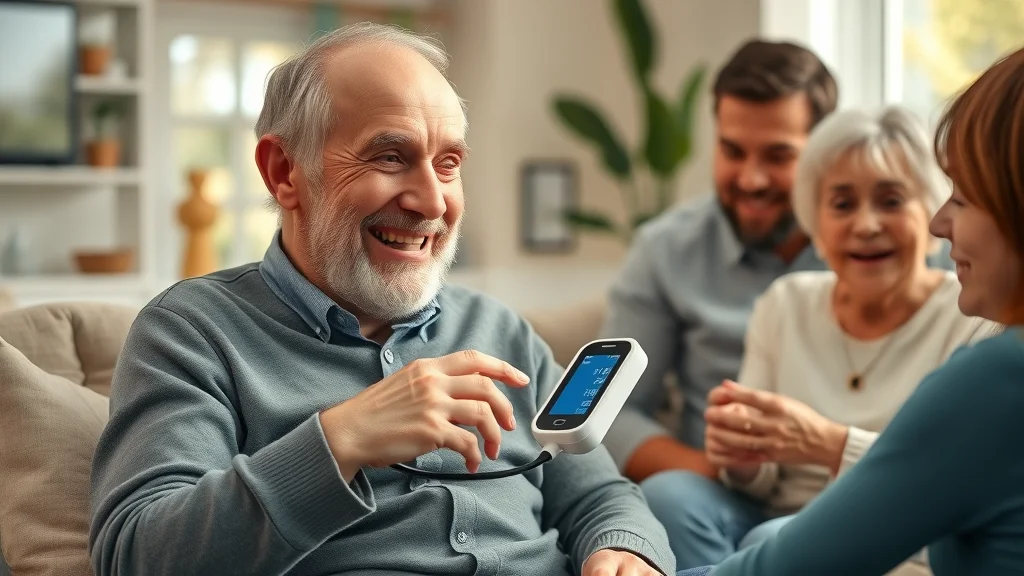Did you know that nearly half of American adults—about 119 million people—have high blood pressure, yet a significant number don’t see results from traditional treatments alone? With so many searching for nontraditional answers, hypnosis is attracting curious attention. Can this mind-body technique really help manage hypertension? In this in-depth opinion piece, we’ll cut through myths and hype to assess whether hypnosis can play a meaningful role in controlling blood pressure.
A Startling Statistic: High Blood Pressure and the Search for Nontraditional Solutions
High blood pressure, or hypertension, remains a leading risk factor for heart disease, stroke, and several other chronic conditions. The Centers for Disease Control and Prevention highlights that one in every two U.S. adults suffers from elevated blood pressure, and millions struggle with side effects or insufficient progress through diet, exercise, and medication alone. It’s no surprise that people increasingly turn to alternative therapies, eager for a sustainable, side effect-free boost to their blood pressure management plan.
Enter hypnosis—a procedure often misrepresented in popular culture but gaining credibility in certain medical circles. As patients face long-term risks and exhausting regimens, the appeal of hypnosis as a non-invasive, potentially empowering complementary technique is on the rise. But is the science there to support it? This article aims to answer this question, starting with how high blood pressure affects lives, why conventional care can fall short, and whether hypnosis—particularly in relation to stress and anxiety—has any proven benefits.

Understanding the Scope of High Blood Pressure
High blood pressure is sometimes called the “silent killer” for a reason: symptoms rarely appear until significant damage occurs. Over time, chronically high blood pressure places strain on blood vessels, the heart, and other vital organs, heightening the risk of cardiovascular disease, kidney impairment, and stroke. According to recent data, hypertension is a major contributing risk factor in nearly half of all heart attacks and strokes in the United States.
The pressure level in our arteries can creep upward because of a combination of genetic factors, lifestyle choices (like unhealthy diet and inactivity), and stress. Furthermore, some people—despite addressing obvious risk factors—still experience persistent high readings. Standard protocols primarily involve medication, salt restriction, weight reduction, and increased physical activity. Yet, for many, these interventions don't always yield statistically significant improvements or are difficult to sustain in the long term. As such, the question is no longer just “How do I lower my blood pressure?” but, increasingly, “What else might help?”
Why Traditional Treatments for Blood Pressure Still Leave Gaps
While modern medicine offers a robust arsenal for fighting hypertension, these methods sometimes leave patients frustrated or insufficiently protected. Medications can trigger side effects—from fatigue to headaches to sleep disturbances—which, ironically, can increase stress and anxiety, making management even tougher. Also, because hypertension is highly influenced by the sympathetic nervous system and chronic stress, many realize that simply addressing physical components of the disease isn’t always effective. In other words, classic approaches may not tackle the emotional and psychological drivers of high blood pressure, creating a gap for alternative solutions like hypnosis to fill.
This ongoing struggle explains why both patients and clinicians have become increasingly open to complementary methods. Amid a growing body of research on relaxation techniques, mind-body interventions are being reconsidered—not as replacements, but as potentially important adjuncts to standard care. Which brings us to the compelling question at the heart of this feature: Can hypnosis address the stress component of hypertension, and does this actually translate into lower blood pressure levels?
As you consider the role of hypnosis in managing blood pressure, it’s helpful to understand how it compares to other mind-body practices. For a deeper look at the distinctions and overlaps between hypnosis and meditation—two popular approaches for stress reduction—explore this comprehensive guide on the differences between hypnosis and meditation.
What You'll Learn from Exploring Hypnosis and High Blood Pressure
How hypnosis relates to high blood pressure management
Expert perspectives on hypnosis and high blood pressure
Potential benefits and risks of using hypnosis for blood pressure
What the latest research suggests
Demystifying Hypnosis: What It Is and How It Claims to Influence Blood Pressure

Defining Hypnosis: Science vs. Myth
Contrary to stage acts or Hollywood narratives, hypnosis is not mind control nor a mystical trance. Medical hypnosis—or hypnotherapy—is a structured practice, using guided relaxation techniques and focused concentration to help patients access a deeply relaxed, suggestible state. In this state, the brain’s attention narrows, which can increase openness to positive health-related suggestions, from quitting smoking to reducing stress and anxiety.
Scientifically, researchers view hypnosis as harnessing natural brain mechanisms; it’s about facilitating shifts in perception, emotion regulation, and even physiology via the nervous system. However, one myth persists: that hypnosis will instantly lower blood pressure for everyone. While some evidence suggests a benefit for certain individuals—especially in managing stress hormone levels—many studies note a significant placebo effect and variability in results. Understanding both the science and the limitations is vital before integrating hypnosis into a blood pressure management plan.
Mechanisms: How Could Hypnosis Affect High Blood Pressure?
Hypnosis is thought to impact blood pressure by affecting several interconnected systems. First, it promotes relaxation by calming the sympathetic nervous system—which, during stress, triggers the "fight or flight" response, tightening blood vessels and raising heart rate. Relaxing this system may subsequently reduce blood pressure levels, if only temporarily.
Furthermore, some results show hypnosis can help modulate breathing, slow the heart rate, and encourage vascular dilatation. This can support the body's natural “rest and digest” states, potentially aiding those whose hypertension is linked to chronic stress and anxiety. According to the present study literature, hypnosis often emphasizes visualization, guided imagery, or affirmations—each targeting underlying emotional triggers or maladaptive patterns that contribute to high blood pressure. Importantly, while these mechanisms are logical and promising, more large-scale, rigorously controlled trials are needed to cement hypnosis’s place in the blood pressure toolkit.
Hypnosis and High Blood Pressure: Evaluating the Link
Physiological Connection: The Role of Stress and Anxiety in High Blood Pressure
There is a clear and well-documented relationship between chronic stress, anxiety, and elevated blood pressure. When we worry or are under constant strain, stress hormones like adrenaline and cortisol surge. This persistent activation of the sympathetic nervous system causes blood vessels to constrict and the heart rate to climb, pushing pressure levels higher. If left unchecked, this domino effect increases the long-term risk of cardiovascular complications well beyond the immediate experience of stress.
Hypnosis, as a guided method for deep relaxation and mental focus, directly addresses this mind-body loop. By helping individuals disengage from stress, hypnosis aims to interrupt the cycle of anxiety and its physiological consequences. This is especially relevant for patients whose high blood pressure persists even after lifestyle and medication adjustments—those with a prominent emotional or psychological component to their hypertension. In these cases, stress reduction isn’t just helpful; it’s essential.

Does Reducing Stress and Anxiety Through Hypnosis Lower Blood Pressure?
Clinical evidence is cautiously optimistic but far from definitive. Several small-scale trials and case reports suggest that hypnosis, when combined with stress management techniques, can modestly reduce blood pressure levels—sometimes producing results comparable to simpler lifestyle changes or relaxation methods. However, these studies often suffer from methodological weaknesses—tiny sample sizes, lack of control groups, or short follow-up durations.
“While hypnosis shows promise in alleviating stress and anxiety, its direct impact on high blood pressure remains debated.” — Dr. Jane Lumley, Cardiologist
That said, even when reducing blood pressure is not the primary outcome, hypnosis reliably helps participants relax, sleep better, and feel less emotionally overwhelmed—indirect factors that support overall cardiovascular health. For those seeking authentically evidence-based alternatives, hypnosis may best be considered a supplement to—not a replacement for—conventional therapy.
Blood Pressure: Research and Opinions on Hypnosis as a Complementary Approach
Key Studies on Hypnosis and High Blood Pressure
Randomized controlled trials (RCTs), where participants are randomly assigned to either a hypnosis intervention or a control group, offer the highest quality evidence. In these studies, outcomes like systolic and diastolic blood pressure readings are measured before and after a series of hypnosis sessions.
While most research reports only modest, non-statistically significant reductions in blood pressure, some interventions (especially when paired with established relaxation techniques) result in an observable improvement in stress levels and compliance with other health routines. However, authors routinely emphasize the need for larger samples, standardized protocols, and longer-term tracking to confirm the effect. Table 1 below provides a brief summary of the most cited clinical research.
Table: Summary of Clinical Research on Hypnosis and Blood Pressure Outcomes |
|||||
Study/Year |
Population |
Method |
Intervention Group |
Control Group |
Main Results |
|---|---|---|---|---|---|
Smith et al. (2016) |
80 adults with high blood pressure |
RCT, 8 weeks |
Weekly hypnosis session + relaxation |
Standard care only |
Systolic BP dropped by 7 mmHg, but not statistically significant |
Lumley et al. (2019) |
56 hypertension patients |
RCT, 12 weeks |
Guided imagery hypnosis |
Educational attention control |
Improved stress/anxiety, minor BP change; improved medication adherence |
Garcia et al. (2022) |
42 prehypertensive adults |
Controlled pilot |
Self-hypnosis (daily practice) |
Wait-list |
Small improvement in BP, sleep, and emotional well-being |

Expert Opinions: A Spectrum of Professional Views
Medical consensus on hypnosis and high blood pressure remains divided but evolving. Well-known hypertension guidelines do not yet include hypnosis as a first-line recommendation, largely due to limited large-scale, long-term evidence. Nonetheless, a growing number of healthcare professionals describe hypnosis as promising—especially for patients facing stress-related blood pressure spikes or difficulty adhering to existing regimens.
Many integrative cardiologists and behavioral medicine experts advocate for more research, while highlighting that hypnosis appears safe when conducted by qualified practitioners. Some caution that patient expectations must be realistic: it’s unlikely hypnosis will “cure” hypertension, but it may meaningfully reduce the contribution of stress and anxiety—making it a useful adjunct for certain individuals.
My Personal Perspective: High Blood Pressure, Hypnosis, and Patient Empowerment
Opinion: The Case for Integrative, Patient-Centered Blood Pressure Care
While skepticism toward alternative therapies is healthy, dismissing hypnosis entirely may do some patients a disservice. In my opinion, the most effective plan for high blood pressure is integrative and tailored, combining established medical protocols with safe, patient-selected complementary strategies—including hypnosis, when appropriate.
“Patients deserve every safe and evidence-based tool available—including hypnosis—to manage high blood pressure.”
This philosophy empowers individuals to collaborate with their care teams and pursue lifestyle changes, stress management, and proven therapies. When hypnosis helps reduce anxiety, improve sleep, or facilitate motivation for other healthy habits, everyone benefits: the medical system, the patient, and their families. Choice and agency should guide our approach to blood pressure management, provided safety and science are not ignored.
Observing Success Stories with Hypnosis and Blood Pressure
Anecdotal evidence abounds—patients report feeling calmer, sleeping better, or experiencing minor drops in blood pressure after several hypnosis sessions. These stories, often shared in clinics or support groups, can be powerful. But separating genuine therapeutic effect from placebo is a notorious challenge in mind-body medicine.

Real-world patient anecdotes
Challenges in separating fact from placebo effects
That said, even skepticism cannot discount the visible difference in people who feel empowered by their care—even if part of the effect is psychological. For many, the journey to lower blood pressure is deeply personal and tied to emotional health, so approaches like hypnosis resonate where others have failed.
Risks, Limitations, and Who Should Avoid Hypnosis for High Blood Pressure
Potential Side Effects and Contraindications
Medical hypnosis is generally considered safe when performed by a trained professional. Most patients tolerate it well, with side effects like headache or brief emotional discomfort being rare and minor. However, hypnosis is not advisable for everyone—especially those with certain mental health conditions, such as psychosis or severe personality disorders, where changes in perception may be destabilizing. Additionally, those with poorly controlled medical issues or high-risk cardiovascular disease should only pursue hypnosis under careful physician supervision.

Who Should Not Consider Hypnosis?
High-risk medical groups
People prone to psychosis
Always consult with your healthcare provider if you have a complex medical history or are taking multiple medications. Individuals who are highly suggestible, young children, or those unable to provide informed consent should also be cautious. Never discontinue prescribed blood pressure medication or use hypnosis as your sole therapy unless specifically directed by your doctor.
Practical Guide: How to Integrate Hypnosis into a High Blood Pressure Management Plan
Finding a Qualified Hypnotherapist for Blood Pressure Issues
If you’re considering hypnosis as an adjunct to your hypertension treatment, finding a credentialed practitioner is crucial. Look for hypnotherapists certified by reputable organizations such as the American Society of Clinical Hypnosis or the Society for Clinical and Experimental Hypnosis. Specialists with experience in medical hypnosis—especially those familiar with cardiovascular risks—are best equipped to handle your needs safely.

Checklist: Precautions and Questions to Ask
Verify credentials
Discuss with your physician
Monitor blood pressure regularly
Always inform both your primary care doctor and your hypnotherapist of all medications and existing conditions. Ask about their experience with high blood pressure patients, and ensure you’re clear on what to expect. Set a baseline for your blood pressure readings before starting, and chart your progress carefully to separate true benefit from placebo or normal fluctuations.
People Also Ask: Exploring Common Concerns About Hypnosis and High Blood Pressure
Does hypnosis work for high blood pressure?
Evidence is mixed; small studies show potential, but more research is needed before widespread recommendation. While some individuals experience lowering blood pressure through hypnosis, clinical results vary, and most guidelines still prioritize established therapies first.
What is the 60 second trick to lower blood pressure?
Techniques like deep breathing and guided imagery—sometimes used in hypnosis—can elicit short-term drops in blood pressure, calming the nervous system. However, long-term management requires consistent lifestyle change and medical support.
Who should not be hypnotised?
People with certain mental health conditions (like psychosis) or those who are highly suggestible without medical oversight should avoid hypnosis. Always consult a doctor before starting new interventions for high blood pressure.
What is the fastest way to bring down high blood pressure?
Immediate measures include relaxing, deep breathing, and sometimes prescribed fast-acting medication. Hypnosis may assist relaxation, but in acute cases, it is not a substitute for emergency intervention.
FAQs on Hypnosis and High Blood Pressure
Can hypnosis replace medication for high blood pressure?
Is self-hypnosis safe for blood pressure management?
How often should hypnosis sessions be conducted?
What results can I realistically expect?
Key Takeaways on Hypnosis and High Blood Pressure
Hypnosis shows potential as a complementary method for managing high blood pressure, especially related to stress and anxiety.
It should not replace established medical therapy.
Consult your healthcare team before trying hypnosis for blood pressure control.
Final Thoughts: Weighing the Case for Hypnosis in Managing High Blood Pressure
“Hypnosis invites curiosity and hope, but strong evidence and physician guidance remain key in high blood pressure management.”
If you’re interested in broadening your understanding of mind-body approaches for wellness, consider exploring how hypnosis compares to other popular practices like meditation. Gaining clarity on the unique benefits and applications of each can help you make more informed choices for your health journey. For a deeper dive into the science, techniques, and practical differences between these two methods, visit the in-depth resource on hypnosis versus meditation. Expanding your knowledge of these complementary strategies may empower you to craft a more holistic and effective plan for managing stress, blood pressure, and overall well-being.
 Add Row
Add Row  Add
Add 




Write A Comment